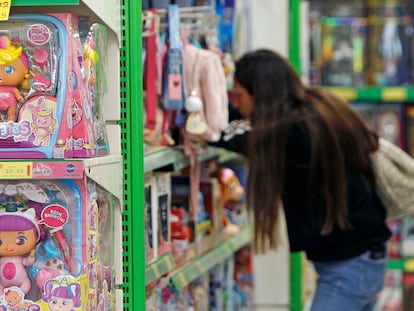The ‘kidult’ economy, or when adults enjoy playtime more than children
Adults are buying Lego pieces, toy cars and board games like never before. This is bolstering a sector that hasn’t experienced growth in years


“I love Lego. It calms me down a lot,” David Beckham confessed, in an interview that took place four years ago. For a time, photos of the former soccer player building a car, a spaceship, or a double-decker bus became common on his Instagram profile and went viral on social media. In one of the posts, he was drinking from a glass of wine, proudly showing off how he had completed a huge Lego replica of Harry Potter’s castle. Sometimes, he noted, he would stay until two in the morning building a figure. “On the box, it says that it’s for children 11 and older,” he joked.
Beckham isn’t the only person over 40 who’s fond of playing with Lego pieces. The so-called “kidult economy” — which spans several generations — is booming. The word, which comes from combining “kid” and “adult,” refers to the part of the adult population that buys toys for themselves. This sector has grown to reach 25% of toy sales in countries such as Spain, according to Circana, a firm that specializes in looking at consumer behavior. “Toy sales to children have decreased by [$200 million] since 2019, but they’ve increased by $1 billion for the ‘kidult’ market in Europe (which includes the United Kingdom, France, Germany, Italy and Spain),” said Frédérique Tutt, vice president of the company, in a statement last May.
Toy companies — concerned about the decline in sales to children — have detected this vein and are acting accordingly. Lego — the legendary Danish construction toy production company — is one of the firms that has taken the biggest steps towards developing its products for the adult segment of the market. In a specific section of their website, you can find the Lego version of The Great Wave off Kanagawa (1831), the famous Japanese painting by Hokusai, which depicts a huge wave in the middle of a raging sea. The company has also created floral arrangements out of blocks and even a Lego model of a typical red telephone booth from London.
Not long ago, Gonzalo, a 25-year-old cybersecurity specialist, spent his Saturday nights having mixed drinks at a nightclub in Madrid. But today, he invites his friends over to play a game of Virus, a childlike card game that he loves and which consists of obtaining four organs (heart, stomach, lungs and brain) before the rest of the players. Together, the friends put on music, pour some wine and grab something to eat. Gonzalo does the honors and distributes the cards. “We’re at a time in life when staying home with your friends is much more fulfilling than going out to party. That no longer entertains us,” he tells EL PAÍS by phone.
At Scalextric — a company that produces slot car racing sets — they already have a specific campaign for clients like Gonzalo. “We do it through Instagram, posting stories that fit the adult profile,” explains Joaquín Solleone, head of sales for the company in Spain, in an interview with EL PAÍS. He believes that the phenomenon goes beyond nostalgic people who used to play with toy cars as children. “People who have never owned a Scalextric set in the past are also buying.”
This phenomenon is revolutionizing his company: 53% of the 1:32 scale cars — the ones used to race on the tracks — are now sold to adults. In the company as a whole, the kidult market currently represents 20% of total sales. “How do we reach that older generation? Well, by manufacturing in the most faithful way possible [to the original cars] and by paying attention to product details,” Solleone notes. He emphasizes that while kidults have money to spend and don’t think about price as much, they look for quality in what they buy (unlike less discerning children).
Return to childhood
“[Kidaults] are people who have all the roles of an adult — [they have careers] and stable relationships — but, in these games, they find a moment to return to childhood,” points out psychologist María Dolores Delblanch. This diagnosis is far from the so-called “Peter Pan syndrome,” when adults reject the obligations of their age “due to lack of confidence or fear of failure” and spend their lives “playing, as a way to hide and avoid life.” Delblanch clarifies that “this phenomenon isn’t like that at all.”
Gonzalo analyzes his friend group’s interests from an economic point of view. “We don’t have the purchasing power to spend the weekend traveling or going to a country house or skiing,” he notes. And going clubbing doesn’t leave room for other things. “You’re working all week and the last thing you want is to party until six in the morning and lose the entire next day because of a hangover. In the end, you spend five days working, one day partying and one day hungover. When you’re [an adult], the weekend is the only time you have to do the tasks that you don’t get a chance to do during the week, like laundry, cleaning the house, going shopping. So, the best option ends up being to get together and play with friends.”
Psychologist Carolina Casado affirms that these types of activities help “cement the feeling of belonging and connection with others, but also with oneself and being able to get in touch with childhood.” She, Solleone and Maite Francés — marketing director for the Spanish Association of Toy Manufacturers — believe that the pandemic marked a turning point in this trend. It was after the boom in toy sales that occurred at the time when specialists began to detect that there was a group that didn’t stop buying, even after the lockdowns. More and more adults were suddenly interested in products such as board games, construction Legos, or puzzles.
The nostalgia market was joined by a new group that bought toys for fun, or to collect something they had never had before. “It’s become very normalized. The adults are playing again,” Francés notes. “The toy sector is experiencing [a drop in birth rates]. Additionally, children stop playing earlier and earlier to switch to video game consoles. However, the adult segment continues to grow,” she explains.
The concept of “kidult” is difficult to define. For some firms — such as Scalextric — it encompasses older generations, such as those born in the 1960s. For card game companies, their favorite demographics are millennials and Gen Zs. Francés feels that all these groups are part of the kidult economy.
An article by the corporate news platform Interempresas — which analyzes such phenomena — explains that kidults are “adults with a childlike spirit. Kidults have a complete professional life and are by no means adults trapped in childhood. They simply want to have fun in their free time.”
Gonzalo counts himself as one of them. “You don’t see your friends all week, you meet up, you make dinner, you play some dinner party games… and, between games, you chat a little. The next day, you feel good as new, and you haven’t spent a penny!”
Sign up for our weekly newsletter to get more English-language news coverage from EL PAÍS USA Edition
Tu suscripción se está usando en otro dispositivo
¿Quieres añadir otro usuario a tu suscripción?
Si continúas leyendo en este dispositivo, no se podrá leer en el otro.
FlechaTu suscripción se está usando en otro dispositivo y solo puedes acceder a EL PAÍS desde un dispositivo a la vez.
Si quieres compartir tu cuenta, cambia tu suscripción a la modalidad Premium, así podrás añadir otro usuario. Cada uno accederá con su propia cuenta de email, lo que os permitirá personalizar vuestra experiencia en EL PAÍS.
¿Tienes una suscripción de empresa? Accede aquí para contratar más cuentas.
En el caso de no saber quién está usando tu cuenta, te recomendamos cambiar tu contraseña aquí.
Si decides continuar compartiendo tu cuenta, este mensaje se mostrará en tu dispositivo y en el de la otra persona que está usando tu cuenta de forma indefinida, afectando a tu experiencia de lectura. Puedes consultar aquí los términos y condiciones de la suscripción digital.








































